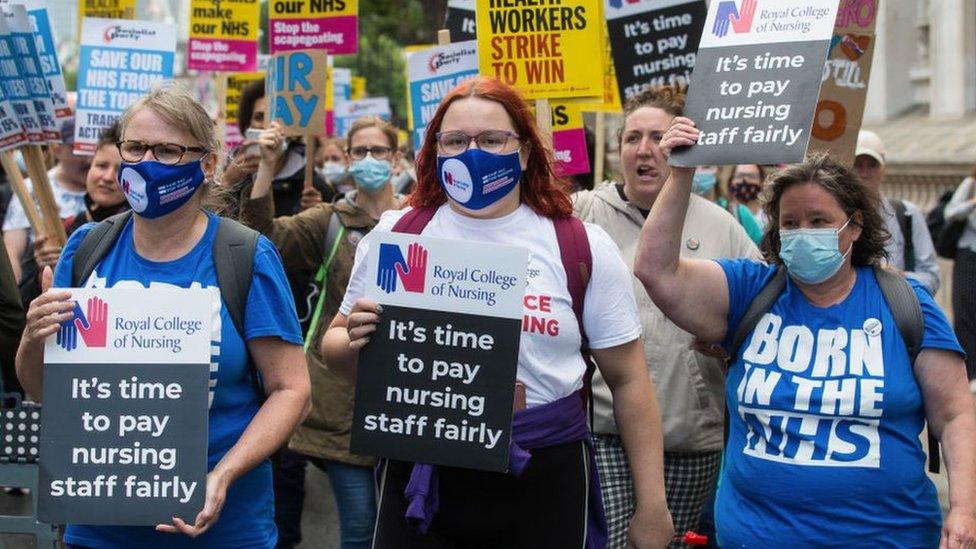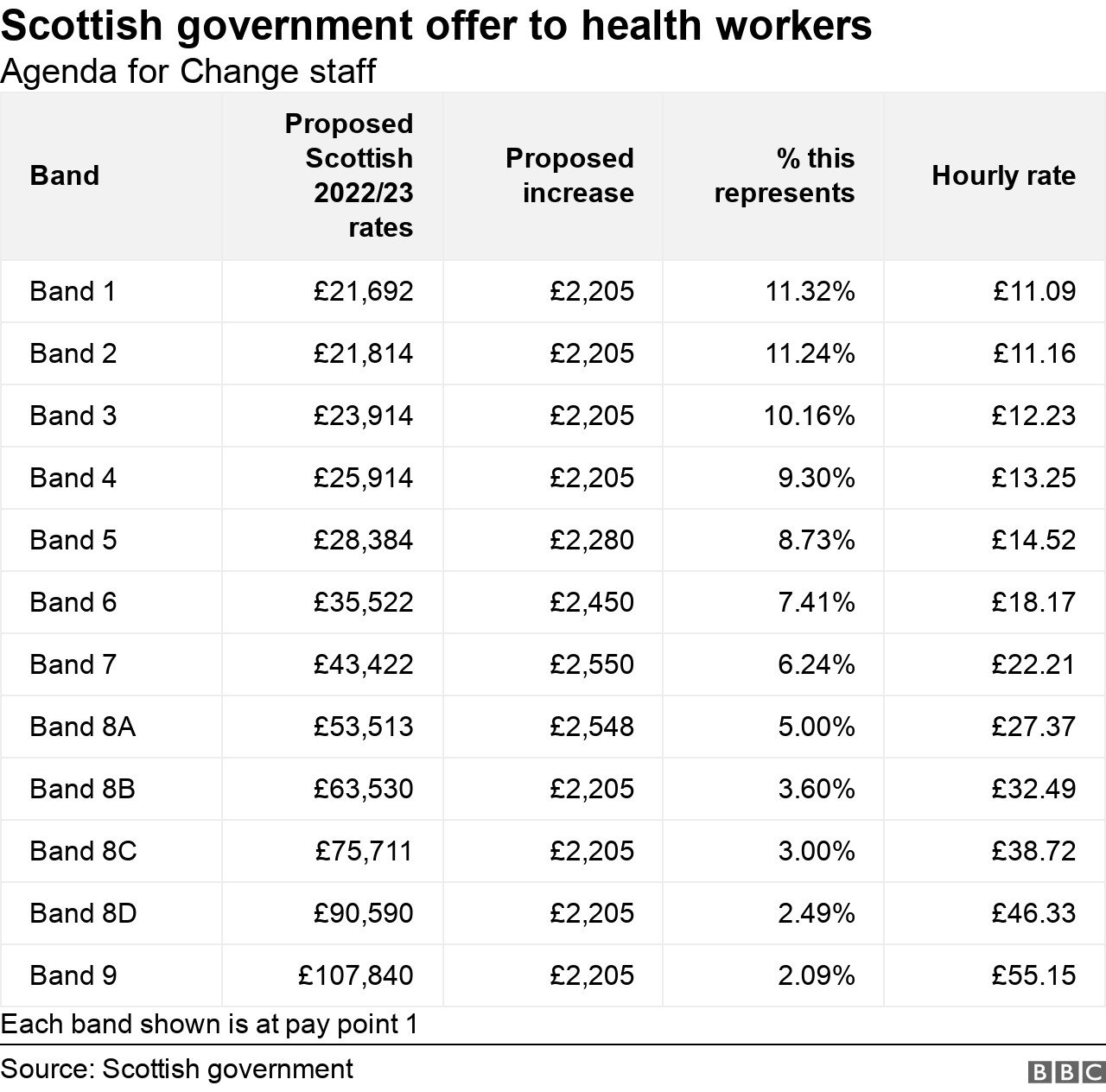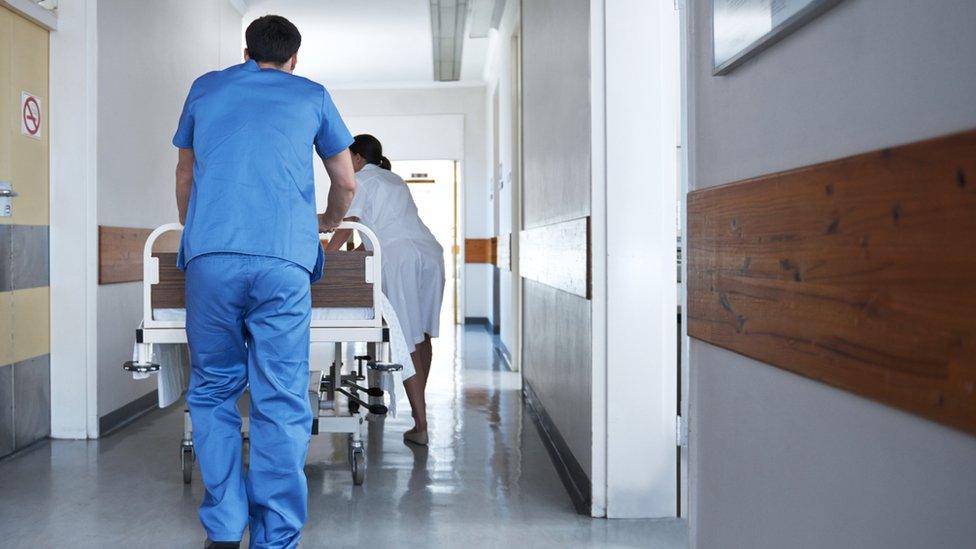New pay offer made to NHS Scotland health workers
- Published

The Royal College of Nursing has voted to take strike action
An improved pay offer averaging 7.5% has been made to NHS Scotland health workers threatening industrial action.
The Scottish government's £515m deal will now be considered by unions.
First Minister Nicola Sturgeon and Health Secretary Humza Yousaf were involved in "extensive" talks ahead of this latest proposal.
Unite and GMB have both suspended action by ambulance staff and confirmed that the offer will be put to members in a ballot.
Unite's Scottish Ambulance Service members had planned a work-to-rule on Friday and 1,700 GMB members were scheduled to begin a 26-hour strike on Monday.
The RCN, which had delayed a formal announcement on strikes while negotiations took place this week, confirmed that its board members would consider the detail of an offer that "still does not meet our members' expectations".
It had asked for at least 5% above inflation, which is currently 11.1%.
However, the Scottish government said the new deal was a "record high pay offer" for front line employees, including nurses, paramedics, allied health professionals and healthcare support staff.
Annual pay rises under the latest deal would range from a flat rate payment of £2,205 for staff in Bands 1 to 4 and up to £2,660 for staff in Bands 5 to 7, backdated to April.
This represents an increase of 11.3% for the lowest paid workers and delivers an average uplift of 7.5%, a government spokesperson said.

An earlier version of this table was incorrectly labelled. This was due to an error in information supplied by the Scottish government.
The new offer for staff on Agenda for Change contracts also included a review into reducing the working week from 37.5 hours to 36 hours with no loss of pay.
Mr Yousaf said no stone had been left unturned to reach its "best and final pay offer".
He said: "We have made the best offer possible to get money into the pockets of hard working staff and to avoid industrial action, in what is already going to be an incredibly challenging winter."
Humza Yousaf said he hoped health workers would accept this "final" offer
What are the unions saying?
Royal College of Nursing - Colin Poolman, RCN Scotland director, said the offer was "disappointing" but their board would "consider the offer in the usual way".
Chartered Society of Physiotherapy - described the deal as an "encouraging forward step" and said a committee would consider their next move.
Unison - recommended that its 50,000 members - including nurses, midwives, health visitors, healthcare assistants, paramedics, occupational therapists, cleaners and porters - accept the deal. Wilma Brown, chair of its Scotland health committee, said she recognised that the new package was the best that could have been negotiated, but they would have wanted more.
GMB - suspended a 26-hour ambulance strike and will put the new deal to members in a vote. Senior organiser Keir Greenaway said staff needed to be valued to "tackle the chronic understaffing crisis across NHS frontline services" after a decade of cuts and the Covid pandemic.
Unite - suspended work-to-rule action by ambulance staff and will put the new deal to members in a vote.


This is a "final offer" to NHS workers according to the health secretary, who told me there is "zilch, nada, nothing left in the coffers" to improve it further.
Humza Yousaf has found an extra £35m to increase the uplift for middle earners and he's agreed to work towards a shorter working week of 36 instead of 37.5 hours.
This feels like a potential breakthrough with the largest union, Unison, recommending it to its members, the GMB and Unite unions suspending industrial action and the RCN - while unimpressed - agreeing to consider it.
Ministers have prioritised trying to resolve this dispute because they believe NHS strikes would be "catastrophic" in an already overstretched service.
If the offer - typically worth 7.5% - is accepted there is also a hope in government that it might change the conversation with teachers who have been holding out for 10%.


There will be a huge sigh of relief that industrial action has been averted - for now.
The health service is already under severe pressure and any level of disruption would have both short and long term consequences. The health secretary has already described the impact of nurses, paramedics and other key healthcare workers walking out as "catastrophic".
But what does this offer mean?
Pay for NHS Agenda for Change staff - including nurses, ambulance workers, physiotherapists and healthcare assistants - is negotiated by the Scottish government and the various unions that represent them.
They all say that they will consider whether this new offer is enough money. Until then strikes are off.
For some, particularly the lower paid staff, this will be seen as a good deal and the government has found extra money to bump up the pay of those in the middle bands. The likes of a charge nurse will now be looking at around a 6% pay increase.
A review into reducing the working week to 36 hours as well as other well-being measures will also be a morale boost to those on the ground who feel undervalued as well as underpaid.
Of course this doesn't solve the long term problems of staffing for the NHS. One in 10 nursing and midwifery posts are unfilled. And we know demand continues to grow. Junior doctors are also continuing to press the government for an increase in their pay.

Related topics
- Published21 November 2022

- Published15 November 2022

- Published9 November 2022
